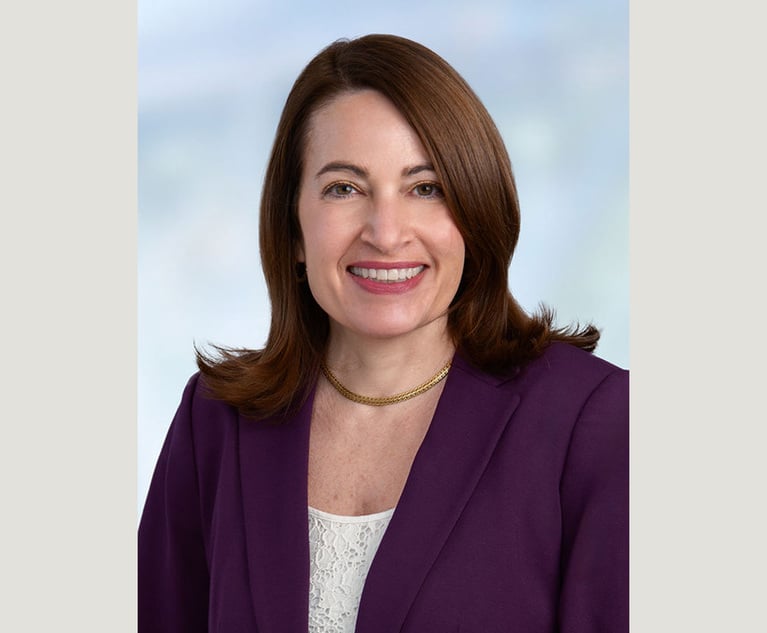Why Pa. Big Law Firms Aren't Sweating So-So Gains in 2018
Pennsylvania-based firms saw varied results in 2018, but revenue per lawyer growth was remarkably similar among them.
March 15, 2019 at 06:12 PM
5 minute read
 Photo: f11photo/Shutterstock.com
Photo: f11photo/Shutterstock.com
Among large law firms founded in Pennsylvania, early reports of 2018 financial results don't show broad-based dramatic gains in profitability, but they do seem to bode well for an industry barreling toward a near future of economic uncertainty and market disruption.
The Am Law 200 firms with Pennsylvania roots have become increasingly disparate over the years, in terms of size, footprint and profitability. Several have seen dramatic changes over recent years, as they engaged in a bustling law firm merger market, and some have seen head count volatility in a competitive lateral hiring landscape. So it can be tricky to compare one firm to another.
But their 2018 results are surprisingly uniform in one respect: They all saw forward movement in revenue per lawyer.
Eleven Pennsylvania-born firms have provided 2018 financial results to ALM. Based on those early reports, eight of those 11 saw RPL increase by 3 to 5 percent—each showing growth, if perhaps short of industrywide expectations following a year of the best demand growth since the Recession.
“These are healthy numbers. You'd like to see it get back into the 6 to 8 percent range, but I don't think folks went into 2018 with those expectations,” said Eric Seeger, a principal at law firm consultancy Altman Weil.
Two were close to that range, but slightly below it: Reed Smith at 5.4 percent RPL growth and Saul Ewing Arnstein & Lehr at 6.5 percent.
Just one firm saw RPL grow by less than 3 percent, and that was Ballard Spahr, which saw its total lawyer head count jump by almost 100 lawyers after its merger with Midwest-based Lindquist & Vennum became effective Jan. 1, 2018. The firm's RPL increased by 0.6 percent in 2018.
That kind of post-merger lag in RPL may seem familiar to Saul Ewing, which in 2017 saw RPL decline from 2016 levels, as a result of its combination with Chicago-based Arnstein & Lehr. It more than made up for that decline in 2018, coming in with the greatest RPL growth among Pennsylvania-born firms, 6.5 percent.
“I think expectations have been re-calibrated,” Seeger said. “Firms seem pretty happy to report 5 percent gains. I don't think that would have been exciting news a dozen years ago.”
Locally based large law firms managed to maintain RPL growth despite fluctuations in head count, due to significant acquisitions and lateral hires or in the case of some firms, group defections of head count trimming.
“Now that we're further out after 2008 … if you look out over the past couple of years or so, the Am Law 100 firms in Pennsylvania are doing pretty well,” Philadelphia-area legal recruiter Frank D'Amore said. That could be “why you've seen some significant firms that are headquartered outside of Pennsylvania decide to come into the market here.”
Early reports have shown much less uniform results for profits per equity partner, and the extremes again showed the impact of a merger on per-lawyer metrics—PEP change ranged from a 2.8 percent dip at post-merger Ballard Spahr, to 8.5 percent growth at Saul Ewing, as it rebounded from its integration year.
The firms with the greatest PEP growth—Saul Ewing, Reed Smith and K&L Gates—saw almost no growth in their equity partner tiers, or, in Reed Smith's case, a 4.4 percent decrease in the number of equity partners.
Still, the average PEP change among all 11 firms was 2.9 percent, the early reports showed.
Gross revenue changes were all over the place, mostly in-line with head count. Still, nine of 11 firms saw gross revenue increases, and the average revenue change was 5.4 percent growth.
“It's pretty consistent with the narrative that's developed over time,” D'Amore said. “In Pennsylvania, a lot of those firms don't hit the highest of highs or the lowest of lows.”
Looking Ahead
That kind of consistency could be good news for this group of firms when the current rate of economic growth inevitably slows.
“Some folks are arguing that we're due for a correction and others are arguing that there's no reason to expect that,” Seeger said. “Firms will have to hunker down again if the economy dips, but they won't be in a position to have to make the massive staffing adjustments that they did 10, 12 years ago.”
Gretta Rusanow, head of advisory services for Citi Private Bank's Law Firm Group, said in a February interview that revenue growth at Pennsylvania firms in 2018 was more about demand growth than rate increases. A survey by Citi found that Pennsylvania firms saw demand grow by 2.6 percent, slightly above the industry average, while rates went up 3.6 percent, notably less than the 4.3 percent industry average.
“I would think the firms are raising rates wherever they can get it. Where they are not, hopefully that has been a successful strategy for locking in clients long-term,” Seeger said.
Meanwhile, few Pennsylvania-based firms actually matched the industry leaders that pushed first-year salaries to $190,000 last year—though a majority of firms in the region raised salaries for associates by some amount in 2018, according to Citi's Philadelphia-based Bradford Winton.
Generally, firms have been “conservative” in their decision-making, Seeger said.
“I don't think we're looking at the same kind of bubble as last time,” he said.
Read More
The Early Reports: 2019 Am Law 100/200 Financials
Demand Drove Financial Gains at Pa. Firms in 2018, Report Says
This content has been archived. It is available through our partners, LexisNexis® and Bloomberg Law.
To view this content, please continue to their sites.
Not a Lexis Subscriber?
Subscribe Now
Not a Bloomberg Law Subscriber?
Subscribe Now
NOT FOR REPRINT
© 2025 ALM Global, LLC, All Rights Reserved. Request academic re-use from www.copyright.com. All other uses, submit a request to [email protected]. For more information visit Asset & Logo Licensing.
You Might Like
View All
Superior Court Directs Western Pa. Judge to Recuse From Case Over Business Ties to Defendant
3 minute read

Neighboring States Have Either Passed or Proposed Climate Superfund Laws—Is Pennsylvania Next?
7 minute readTrending Stories
- 1Perkins Coie Lures Former Longtime Wilson Sonsini Tech Transactions Partner
- 2‘The Decision Will Help Others’: NJ Supreme Court Reverses Appellate Div. in OPRA Claim Over Body-Worn Camera Footage
- 3MoFo Associate Sees a Familiar Face During Her First Appellate Argument: Justice Breyer
- 4Antitrust in Trump 2.0: Expect Gap Filling from State Attorneys General
- 5People in the News—Jan. 22, 2025—Knox McLaughlin, Saxton & Stump
Who Got The Work
J. Brugh Lower of Gibbons has entered an appearance for industrial equipment supplier Devco Corporation in a pending trademark infringement lawsuit. The suit, accusing the defendant of selling knock-off Graco products, was filed Dec. 18 in New Jersey District Court by Rivkin Radler on behalf of Graco Inc. and Graco Minnesota. The case, assigned to U.S. District Judge Zahid N. Quraishi, is 3:24-cv-11294, Graco Inc. et al v. Devco Corporation.
Who Got The Work
Rebecca Maller-Stein and Kent A. Yalowitz of Arnold & Porter Kaye Scholer have entered their appearances for Hanaco Venture Capital and its executives, Lior Prosor and David Frankel, in a pending securities lawsuit. The action, filed on Dec. 24 in New York Southern District Court by Zell, Aron & Co. on behalf of Goldeneye Advisors, accuses the defendants of negligently and fraudulently managing the plaintiff's $1 million investment. The case, assigned to U.S. District Judge Vernon S. Broderick, is 1:24-cv-09918, Goldeneye Advisors, LLC v. Hanaco Venture Capital, Ltd. et al.
Who Got The Work
Attorneys from A&O Shearman has stepped in as defense counsel for Toronto-Dominion Bank and other defendants in a pending securities class action. The suit, filed Dec. 11 in New York Southern District Court by Bleichmar Fonti & Auld, accuses the defendants of concealing the bank's 'pervasive' deficiencies in regards to its compliance with the Bank Secrecy Act and the quality of its anti-money laundering controls. The case, assigned to U.S. District Judge Arun Subramanian, is 1:24-cv-09445, Gonzalez v. The Toronto-Dominion Bank et al.
Who Got The Work
Crown Castle International, a Pennsylvania company providing shared communications infrastructure, has turned to Luke D. Wolf of Gordon Rees Scully Mansukhani to fend off a pending breach-of-contract lawsuit. The court action, filed Nov. 25 in Michigan Eastern District Court by Hooper Hathaway PC on behalf of The Town Residences LLC, accuses Crown Castle of failing to transfer approximately $30,000 in utility payments from T-Mobile in breach of a roof-top lease and assignment agreement. The case, assigned to U.S. District Judge Susan K. Declercq, is 2:24-cv-13131, The Town Residences LLC v. T-Mobile US, Inc. et al.
Who Got The Work
Wilfred P. Coronato and Daniel M. Schwartz of McCarter & English have stepped in as defense counsel to Electrolux Home Products Inc. in a pending product liability lawsuit. The court action, filed Nov. 26 in New York Eastern District Court by Poulos Lopiccolo PC and Nagel Rice LLP on behalf of David Stern, alleges that the defendant's refrigerators’ drawers and shelving repeatedly break and fall apart within months after purchase. The case, assigned to U.S. District Judge Joan M. Azrack, is 2:24-cv-08204, Stern v. Electrolux Home Products, Inc.
Featured Firms
Law Offices of Gary Martin Hays & Associates, P.C.
(470) 294-1674
Law Offices of Mark E. Salomone
(857) 444-6468
Smith & Hassler
(713) 739-1250






